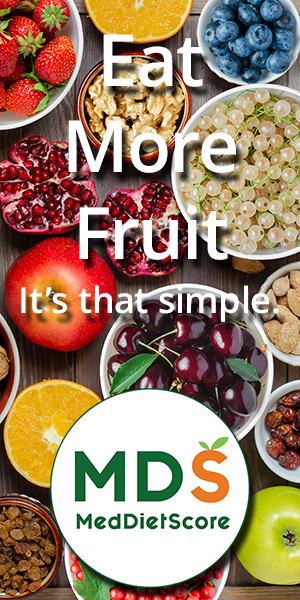Healthy Cooking Columns
The science behind the DASH diet, an overview
Part One | Part Two
The DASH (Dietary Approaches to Stop Hypertension) diet grew out of the Mediterranean diet literature. The original study that helped form the idea of DASH involved 459 adults with prehypertension or stage 1 hypertension.
None of the participants was taking any antihypertensive drugs, and the participants were a 50/50 mix of males and females, with the majority being African American. Over the course of 8 weeks, participants were randomly assigned to one of three diet groups. The diets were prepared for the subjects and picked up at the study center.1
The control group was assigned to a diet that is similar to what Americans typically consume, and was somewhat lower in potassium, magnesium, and calcium. The next group ate similarly to the control group, but consumed much more fruits and vegetables. The third group consumed solely foods from the DASH diet. The DASH diet has many similarities with the Mediterranean diet, but with more adaptations for American taste. There is less emphasis on seafood and more focus on legumes.
View an example of DASH diet plan. (Popup window)
After following these strict diet plans, the group who followed the DASH diet had a significant reduction in blood pressure. The group on the fruit and vegetable diet also had a reduction in their blood pressure, but not as significant as the DASH diet group. Most significantly, there was a marked reduction in blood pressures for those with Stage 1 hypertension who were following the DASH Diet. For many patients this would be significant enough to control blood pressure without medication.
DASH Sodium Study
The three diets in the original study contained 3,000 mg of sodium. Researchers wanted to observe the impact of sodium reduction on hypertensive control, so they designed a second study with similar diets but with three varying levels of sodium intake.2 One group had a daily sodium intake of 3,000 mg/day, the second group had an intake of 2,400 mg/day, and the third group had an intake of 1,500 mg/day.
After following this diet, there was reduction in blood pressure at all three levels of sodium intake, but the most significant reduction came from the group only consuming 1,500 mg/day. The researchers found that lowering sodium intake to 1,500 mg/day reduced blood pressure by twice as much. When the DASH diet was combined with reducing sodium intake, the results in blood pressure reduction were greater, especially in patients with hypertension.
DASH and Heart Disease
Since poor cholesterol scores and high blood pressure can lead to heart disease, it seems reasonable to think that the DASH diet would help reduce the risk of heart disease and stroke. Yet there have been studies of the DASH diet that did not support that conclusion: in fact, one study showed no difference in blood pressure that couldn’t have been chalked up to the amount of weight lost by the test subjects while on the diet. However, researchers at Harvard, Simmons, and the American Cancer Society noted that the study didn’t thoroughly measure how well the test subjects followed the DASH diet. So they came up with a way to score a person’s diet according to how much (or how little) they typically ate of the various components of the diet.3
The group made use of information collected in the Nurses’ Health Study and included in their analysis those women who over the most recent 24 years filled out a number of detailed questionnaires about their dietary habits. A point was given to each test subject for each of the DASH diet components in their regular diet, while points were taken away for foods that those on DASH should avoid, such as red meat or sweetened beverages. The nurses’ dietary scores were then correlated with the scores of those women who experienced heart disease, heart attack or stroke. They found that the higher a nurse’s DASH score was, the less likely they were to have heart disease or stroke. In fact, those with the highest scores reduced their risk by as much as 26%.4
References
1. Appel LJ, Moore TJ, Obarzanek E, et al. A clinical trial of the effects of dietary patterns on blood pressure. DASH Collaborative Research Group. N Engl J Med 1997;336(16):1117-1124
2. Sacks FM, Svetkey LP, Vollmer WM, et al. Effects on blood pressure of reduced dietary sodium and the Dietary Approaches to Stop Hypertension (DASH) diet. DASH-Sodium Collaborative Research Group. N Engl J Med 2001(1);344:3-10
3. Writing Group of the PREMIER Collaborative Research Group. Effects of comprehensive lifestyle modification on blood pressure control: main results of the PREMIER clinical trial. JAMA 2003;289(16):2083-2093
4. Fung TT, Chiuve SE, McCullough ML, Rexrode KM, Logroscino G, Hu FB. Adherence to a DASH-style diet and risk of coronary heart disease and stroke in women. Arch Intern Med 2008;168(7):713-720. doi:10.1001/archinte.168.7.713.
Eat Healthy
Eating healthy is easy and less expensive than most people think.




